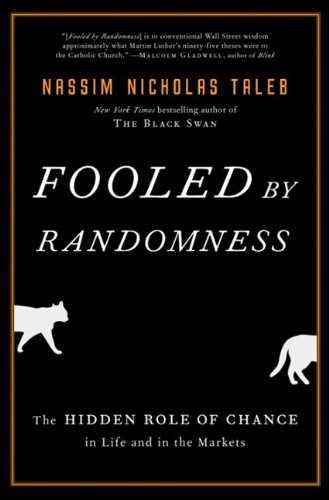Your one stop book summary, audiobook and book review spot for:
Fooled by Randomness Summary
About Fooled by Randomness Book
Fooled by Randomness is a standalone book in Nassim Nicholas Taleb’s landmark Incerto series, an investigation of opacity, luck, uncertainty, probability, human error, risk, and decision-making in a world we don’t understand. The other books in the series are The Black Swan, Antifragile, Skin in the Game, and The Bed of Procrustes.
Fooled by Randomness is the word-of-mouth sensation that will change the way you think about business and the world. Nassim Nicholas Taleb–veteran trader, renowned risk expert, polymathic scholar, erudite raconteur, and New York Times bestselling author of The Black Swan–has written a modern classic that turns on its head what we believe about luck and skill.
This book is about luck–or more precisely, about how we perceive and deal with luck in life and business. Set against the backdrop of the most conspicuous forum in which luck is mistaken for skill–the world of trading–Fooled by Randomness provides captivating insight into one of the least understood factors in all our lives. Writing in an entertaining narrative style, the author tackles major intellectual issues related to the underestimation of the influence of happenstance on our lives.
The book is populated with an array of characters, some of whom have grasped, in their own way, the significance of chance: the baseball legend Yogi Berra; the philosopher of knowledge Karl Popper; the ancient world’s wisest man, Solon; the modern financier George Soros; and the Greek voyager Odysseus. We also meet the fictional Nero, who seems to understand the role of randomness in his professional life but falls victim to his own superstitious foolishness.
However, the most recognizable character of all remains unnamed–the lucky fool who happens to be in the right place at the right time–he embodies the “survival of the least fit.” Such individuals attract devoted followers who believe in their guru’s insights and methods. But no one can replicate what is obtained by chance.
Are we capable of distinguishing the fortunate charlatan from the genuine visionary? Must we always try to uncover nonexistent messages in random events? It may be impossible to guard ourselves against the vagaries of the goddess Fortuna, but after reading Fooled by Randomness we can be a little better prepared.
Named by Fortune One of the Smartest Books of All Time
A Financial Times Best Business Book of the Year
See More
4.4/5 (7679 reviews)
Audio and text
Download free PDF
The World isn't what it seems. This book provides a glimpse of the hidden green code of the Matrix.
Fooled by Randomness: The Premise
Randomness, chance, and luck influence our lives and our work more than we realize. Because of hindsight bias and survivorship bias, in particular, we tend to forget the many who fail, remember the few who succeed, and then create reasons and patterns for their success even though it was largely random.
Mild success can be explainable by skills and hard work, but wild success is usually attributable to variance and luck.
113
Life isn’t fair, Which Is Great
Many systems we move and live works in linear fashion mean in sequential form, usually in one line, with every day of your work you move closer to your promotion, when you go to school you move closer to graduation, with every savings you do, you move closer to your retirement same lifestyle, and so on.
Because of all these events we think that life is linear, or sequential, but that’s not the actual fact.
104
We need Irrationality
We need irrationality to make certain decisions.
If we make every single of our decisions based on rational reasoning then we may not be able to survive or we will cease to exist. Not every decision or choice can be easy, some choices can be indifferent like there can be some choices whose outcome will neither make us feel better and will not be able to make us feel worse.
If you want to invest money, by thinking rational like the market can go down or can go up, by thinking this way you won’t be able to make a proper decision, unless you are being slightly irrational.
104
Have you ever heard about people say these words 'don't be fooled by numbers, the mind wants you to see what you see.'
Skewness Issue
It does not matter how frequently something succeeds if failure is too costly to bear. ( Like playing russian roulette)
4
We Are Obsessed With Outcomes
Quality of a decision cannot be solely judged based on its outcome.
The epic poet (Homer) did not judge his heroes by the result: heroes won and lost battles in a manner that was totally independent of their own valor; their fate depended upon totally external forces, generally the explicit agency of the scheming gods (not devoid of nepotism).
Heroes are heroes because they are heroic in behavior, not because they won or lost.
One cannot judge a performance in any given field by the results, but by the costs of the alternative (i.e. if history played out in a different way).
6
Stochastic processes
The notion of path, as opposed to outcome, indicates that it is not a mere MBA-style scenario analysis, but the examination of a sequence of scenarios along the course of time.
We are not concerned with what the investor's worth would be in, say, a year, but rather of the heart-wrenching ride she may experience during that period.
4
Mathematics is not just a numbers game, it's a way of thinking.
NISSIM NICHOLAS TALEB
21
Autor Nassim Nicolas Taleb describes how life is more random than we assume.
Fooled By randomness
Author explains that everything is random
2
Wind extinguishes a candle but energizes the fire.
NASEEM TALEB
3
Supercharge your mind with one idea per day
Enter your email and spend 1 minute every day to learn something new.
I agree to receive email updates
